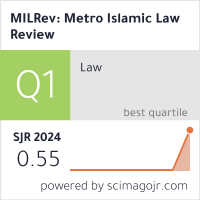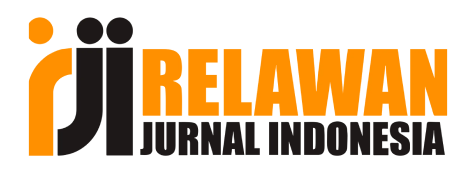Legal Framework Model for Sustainable Solid Waste Management in Indonesia: A Contemporary Environmental Fiqh Perspective
DOI:
https://doi.org/10.32332/milrev.v4i2.11104Keywords:
Fiqh Al-Biʾah, Environmental Law, Islamic Green Finance, Waste Governance.Abstract
Indonesia faces a severe solid waste crisis, with more than 60 million tons generated annually. Weak law enforcement and insufficient fiscal support—regional budget allocations averaging only 0.6–1% of APBD, far below the 3% benchmark—have further exacerbated the problem. This study aims to develop an integrative legal framework for sustainable waste management that harmonises national environmental law with contemporary Islamic environmental jurisprudence (fiqh al-biʾah). Methodologically, the research employs a systematic review and doctrinal–normative analysis. Data were collected and classified from national statutes, government regulations, regional bylaws, and peer-reviewed literature, as well as case studies from Surabaya, Banyumas, and DKI Jakarta. These materials were then analysed through the lens of uṣūl al-fiqh and qawāʿid fiqhiyyah, including the maxims lā ḍarar wa lā ḍirār, maṣlaḥah ʿāmmah, ḥifẓ al-biʾah, and the principle of istikhlāf. The findings reveal three critical gaps. First, underfunding hinders early-warning systems and sustainable infrastructure. Second, the absence of faith-based fiscal tools—such as Green Zakat and Eco-Waqf—limits financing capacity and raises questions of compatibility with APBN/APBD structures and formal zakat institutions. Third, regulatory disharmony between central and regional authorities undermines effective coordination. This study proposes a holistic model that mandates a minimum 3% APBD allocation, institutionalises Islamic green finance mechanisms, and scales up municipal innovations such as Surabaya’s community-based 3R programs. It also highlights the socio-political dynamics affecting the acceptance of religiously informed legal frameworks. The novelty of this research lies in embedding fiqh al-biʾah into positive law and policy instruments, offering a faith-grounded yet implementable roadmap for Indonesia’s sustainable waste governance.
Downloads
References
Adi, R., & Handayani, N. “Peran Pemerintah dan Masyarakat dalam Pengelolaan Sampah di Daerah Perkotaan.” Jurnal Ekologi Sosial 9, no. 2 (2021): 143–157.
Alfi Maryati. Revolusi Biru: Kebijakan Publik Sektor Maritim di Indonesia. Indonesia Emas Group, 2025.
Anis Mashdurohatun, Muslimah Hayati, Saritua Silitonga, Zaenal Arifin, Amanda Amanda. “The Conserving Agrarian Land for Future Generations: A Policy Blueprint for Indonesia.” Jurnal Hukum Unissula 41, no. 1 (March 2025): 1–18.
Ayuningtyas, R. A. “Penerapan Prinsip 3R (Reduce, Reuse, Recycle) Dalam Pengelolaan Sampah Di Restoran Cepat Saji Kfc Yogyakarta Dalam Era Go-Food (Studi Kasus Restoran Cepat Saji Kfc Sudirman). Penerapan Prinsip 3r (Reduce, Reuse, Recycle) Dalam Pengelolaan Sampah Di Restoran Cepat Saji Kfc Yogyakarta Dalam Era Go-Food (Studi Kasus Restoran Cepat Saji Kfc Sudirman),” 2019, 1–11.
Dewi, S., & Setiawan, A. “Tantangan Pengelolaan Limbah di Indonesia: Peran Pemerintah dan Masyarakat.” Jurnal Pembangunan Berkelanjutan 13, no. 2 (2019): 105–120.
Faisal, I., & Widodo, T. “Studi Komparasi Pengelolaan Sampah di Kota-Kota Besar Indonesia.” Jurnal Pembangunan Berkelanjutan 16, no. 3 (2020): 140–153.
Fitria R. Pengelolaan Sampah di Perkotaan Indonesia. Yogyakarta: Pustaka Alam, 2017.
Fitriana, S N, and I Nur. “Regulation of Foreign Workers Based on Job Creation Act of Maslahah Perspective.” Juris: Jurnal Ilmiah Syariah 20, no. 2 (2021): 179–188. https://doi.org/10.31958/juris.v20i2.4274.
Hadi S. Prinsip dan Praktik Pengelolaan Sampah Berkelanjutan. Jakarta: Penerbit Ekologika, 2018.
Hanim Kamaruddin, Maskun, Farida Patittingi, Hasbi Assidiq, Siti Nurhaliza Bachril, dan Nurul Habib Al Mukarramah. “Legal Aspect of Plastic Waste Management in Indonesia and Malaysia: Addressing Marine Plastic Debris.” Jurnal Sustainability 14, no. 2 (2022): 6985. https://doi.org/10.3390/su14126985.
Hasyim, Yonani, and Serlika Aprita. “The Aspects Of Environmental Law Enforcement In Indonesia And The Implementation Of International Agreements In The Environmental Field In Indonesia.” Nurani 21, no. 2 (2021). https://doi.org/10.19109/nurani.v21i2.8958.
Humaidi, M W, and M Azizah. “Green Philanthropy: Islamic Activism on Indonesia’s Environmental Democracy.” Ijtihad: Jurnal Wacana Hukum Islam Dan Kemanusiaan 24, no. 2 (2024): 167–191. https://doi.org/10.18326/IJTIHAD.V24I2.167-191.
Heryanto, A., & Kurniawati, I. “Tantangan Pengelolaan Sampah Plastik di Indonesia.” 16 1 (2019): 54–68.
Indra, M., & Rahmad, M. “Pengelolaan Limbah Organik di Indonesia: Potensi dan Tantangan.” Jurnal Biodegradasi dan Lingkungan 8, no. 1 (t.t.): 54–69.
Joko, D., & Fitriani, T. “Pengaruh Kebijakan Pemerintah terhadap Pengelolaan Limbah Plastik di Indonesia.” Jurnal Ekonomi dan Lingkungan 22, no. 1 (2021): 100–114.
Kementerian Lingkungan Hidup dan Kehutanan. “Sistem Informasi Pengelolaan Sampah Nasional (SIPSN).” https://sipsn.menlhk.go.id, 2023.
Khasanah, L., & Widyastuti, D. “Pengelolaan Sampah di Kota Surabaya: Antara Kebijakan dan Implementasi.” Jurnal Perkotaan dan Lingkungan 14, no. 2 (2020): 195–210.
Maysaroh, S, A Rokhim, and D Isnaeni. “Implementation of Regional Regulation Number 4 of 2018 by the Bangkalan Regency Government in an Effort to Reduce Flood Intensity in Arosbaya District Reviewed from Islamic Law.” Jurnal Ilmiah Mizani 12, no. 1 (2025): 86–113. https://doi.org/10.29300/mzn.v12i1.7148.
Mufid, Moh. “Fikih Konservasi Laut: Relevansi Fiqh al-bi’ah Di Wilayah Pesisir Lamongan.” Al-Manahij: Jurnal Kajian Hukum Islam 12, no. 1 (2018). https://doi.org/10.24090/mnh.v12i1.1356.
Maitre-Ekern, E. “Re-thinking producer responsibility for a sustainable circular economy from extended producer responsibility to pre-market producer responsibility.” Journal of Cleaner Production 286, no. 125454 (2021).
Marín-González, F., Moganadas, S. R., Paredes-Chacín, A. J., Yeo, S. F & Subramaniam, S. “Sustainable local development: consolidated framework for cross-sectoral cooperation via a systematic approach.” Jurnal Sustainability 14, no. 11 (2022): 6601.
Maskun, Hanim Kamaruddin, Farida Patittingi, Hasbi Assidiq, Siti Nurhaliza Bachril, dan Nurul Habib Al Mukarramah,. “Legal Aspect of Plastic Waste Management in Indonesia and Malaysia: Addressing Marine Plastic Debris.” Jurnal Sustainability 14, no. 12 (2022). https://doi.org/10.3390/su14126985.
Maskun, Hanim Kamaruddin, Farida Patittingi, Hasbi Assidiq, Siti Nurhaliza Bachril, dan Nurul Habib Al Mukarramah. “Plastic Waste Management in Indonesia: Current Legal Approaches and Future Perspectives.” Jurnal Hasanuddin Law Review 9, no. 1 (2023). http://dx.doi.org/10.20956/halrev.v9i1.3683.
Maskun, Hanim Kamaruddin, Rasyikah Md Khalid, Muhammad Anugerah, Wiranti, Siti Nurhaliza Bachril,. “Regulatory Challenges in Wastewater Management and its Impacts on Environmental Sustainability.” Jurnal Hasanuddin Law Review 10, no. 3 (t.t.). http://dx.doi.org/10.20956/halrev.v10i3.5560.
Maskun, Rasyikah Mohamad Khalid, Ratnawati, Muhammad Mutawalli Mukhlis, Wira Anggara, Rafika Nurul Ramadhani Ramli. “Strengthening Indonesia’s Waste Management Laws: Compliance with Public Health and Marine Conservation Norms.” Jurnal Substantive Justice International 7, no. 2 (2025). https://doi.org/10.56087/substantivejustice.v7i2.298.
Mulyadi, T. & Putra, R. S. “Studi tentang Pengelolaan Sampah di Kota-kota Besar Indonesia.” Jurnal Lingkungan dan Kesehatan. 3, no. 25 (2020): 178–191.
Peraturan Pemerintah Republik Indonesia Nomor 81 Tahun 2012 tentang Pengelolaan Sampah Rumah Tangga dan Sampah Sejenis Sampah Rumah Tangga. (2012).
Putra. “Upaya pemerintah dalam menangani masalah pengelolaan sampah di perkotaan.” Detik.com, 2020.
Reza Darma Al Fariz, Ramdiana Muis, Nani Anggraini, ndriyani Rachman, dan Toru Matsumoto. “Good Environmental Governance Roles in Sustainable Solid Waste Management in Indonesia: A Review.” Journal of Community Based Environmental Engineering and Management 8, no. 1 (2024): 45–56. https://doi.org/10.23969/jcbeem.v8i1.12035.
Rois, C, N Jannani, and M H Mufid. “Islamic Law Paradigm Responding Conflicts of Interest of Economic Development and Ecological Conservation Hifdz Al-Bi’ah Perspective.” Al-Istinbath: Jurnal Hukum Islam 9, no. 1 (2024): 193–210. https://doi.org/10.29240/jhi.v9i1.8660.
Sabel, C. F., & Zeitlin, J. “Learning from difference: The new architecture of experimentalist governance in the EU.” European Law Journal 14, no. 3 (2008): 271–327.
Suryani M. Pengelolaan Sampah dan Lingkungan Hidup. Bandung: Penerbit Alam Sejahtera, 2019.
Subli, M, D Syamsuddin, A R Muhammad, and A W Rahim. “Green Investment in Contemporary Islamic Perspective: A Maqasid al-Syarī'ah Analysis of the Mining Industry in Morowali.” MILRev: Metro Islamic Law Review 4, no. 1 (2025): 156–183. https://doi.org/10.32332/milrev.v4i1.10269.
Supriyadi, A P, and D Fidhayanti. “Green Sukuk In Indonesia: Unraveling Legal Frameworks for Sustainable Islamic Bonds.” El-Mashlahah 13, no. 2 (2023): 151–180. https://doi.org/10.23971/el-mashlahah.v13i2.7372.
Triana, Nita, and Farah Nuril Izza. “The Perspective of Islamic Law on The Application of The Polluter Pays Principle in Indonesian Environmental Law.” Al-’Adalah 17, no. 2 (2020). https://doi.org/10.24042/adalah.v17i2.8223.
Utami P & Oktaviani R. “Analisis Pengelolaan Limbah di Industri Manufaktur Indonesia.” Jurnal Industri dan Lingkungan 12, no. 4 (2020): 211–224.
Wiranti. “Juridical Analysis: Online Single Submission (OSS) System for Dynamic Risk-Based Business Licensing.” Jurnal Jurisprudentie 10, no. 1 (2023). https://doi.org/10.24252/jurisprudentie.v10i1.38561.
Downloads
Published
Issue
Section
License
Copyright (c) 2025 Maskun, Ratnawati, Wiranti, Asriyani, Jamal Aslan

This work is licensed under a Creative Commons Attribution-ShareAlike 4.0 International License.










